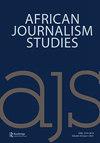津巴布韦新冠肺炎疫情期间的“假新闻”和多重“真相”
IF 1.8
3区 文学
Q3 COMMUNICATION
引用次数: 3
摘要
自2016年美国总统大选以来,围绕“假新闻”这一社会文化现象的争论愈演愈烈。我们的研究对政治两极化和信任缺失的津巴布韦社会中的“真相”概念提出了问题,在津巴布韦社会中,受众被分割并被归类为预定义的过滤气泡。为了理解COVID-19大流行高峰期的这一现象,我们融合了三个分析框架-福柯话语,真相的社会建构和新闻中的外围行动者。在政客们经常把通过主流私人和社交媒体平台传播的新闻斥为“假”的背景下,这一点很有意义。“假新闻”一词作为一种(非)合法化仪式的使用,给人一种印象,即某些媒体机构的公民义务是发布“真实”新闻。尽管津巴布韦政府在与COVID-19相关的问题上自称是“真实的”声音,但通过我们的分析,我们发现了不一致的地方。本文展示了与津巴布韦COVID-19调解有关的“假新闻”话语中嵌入的多个系统层次和结构。我们的文章还认为,必须在公职人员、专业记者和新闻界外围行动者之间的权力关系的背景下理解(非)真相的多重制度。本文章由计算机程序翻译,如有差异,请以英文原文为准。
“Fake News” and Multiple Regimes of “Truth” During the COVID-19 Pandemic in Zimbabwe
ABSTRACT Debates around the sociocultural phenomenon known as “fake news” have gathered storm since the 2016 US Presidential elections. Our study problematises the notion of “truth” in a politically polarised and trust-deficit Zimbabwean society, where audiences are balkanised and pigeonholed into predefined filter bubbles. In order to make sense of this phenomenon during the height of the COVID-19 pandemic, we fuse three analytical frameworks—Foucauldian discourse, social construction of the truth and peripheral actors in journalism. This is pertinent in a context where politicians often dismiss news disseminated through mainstream private and social media platforms as “fake”. This deployment of the term “fake news” as a (de)legitimation ritual creates the impression that there are certain media organisations whose civic duty is to dispense “authentic” news. Although the government of Zimbabwe presented itself as the “authentic” voice on issues related to COVID-19, inconsistencies were observed through our analysis. The article demonstrates the multiple and systemic layers and structures embedded within the discourse of “fake news” related to the mediation of COVID-19 in Zimbabwe. Our article also argues that the multiple regimes of (non)truth must be understood in the context of power relations between public officials, professional journalists and peripheral actors in journalism.
求助全文
通过发布文献求助,成功后即可免费获取论文全文。
去求助
来源期刊

African Journalism Studies
COMMUNICATION-
CiteScore
1.90
自引率
10.00%
发文量
18
期刊介绍:
Accredited by the South African Department of Higher Education and Training for university research purposes African Journalism Studies subscribes to the Code of Best Practice for Peer Reviewed Scholarly Journals of the Academy of Science of South Africa. African Journalism Studies ( AJS) aims to contribute to the ongoing extension of the theories, methodologies and empirical data to under-researched areas of knowledge production, through its emphasis on African journalism studies within a broader, comparative perspective of the Global South. AJS strives for theoretical diversity and methodological inclusivity, by developing theoretical approaches and making critical interventions in global scholarly debates. The journal''s comparative and interdisciplinary approach is informed by the related fields of cultural and media studies, communication studies, African studies, politics, and sociology. The field of journalism studies is understood broadly, as including the practices, norms, value systems, frameworks of representation, audiences, platforms, industries, theories and power relations that relate to the production, consumption and study of journalism. A wide definition of journalism is used, which extends beyond news and current affairs to include digital and social media, documentary film and narrative non-fiction.
 求助内容:
求助内容: 应助结果提醒方式:
应助结果提醒方式:


